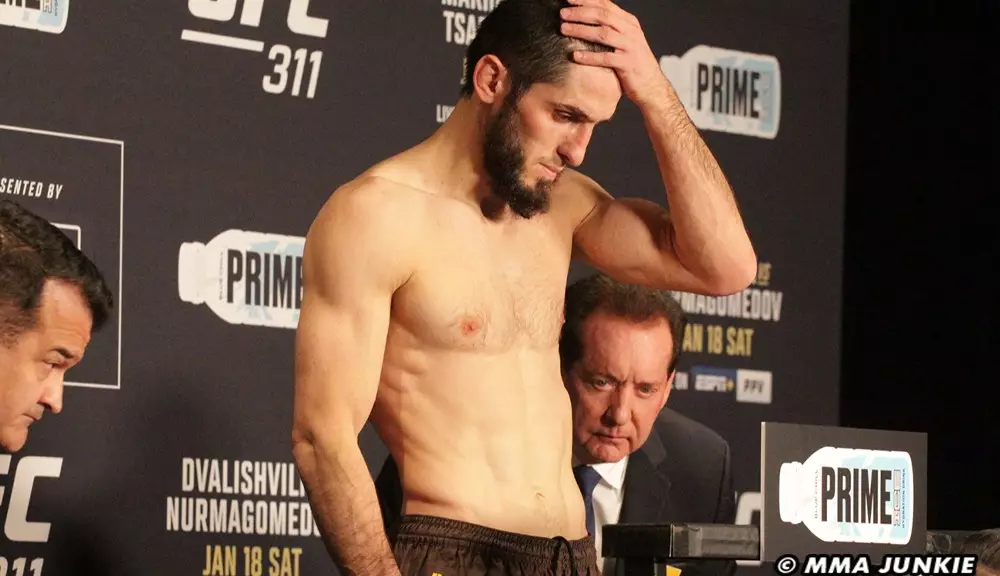The world of mixed martial arts (MMA) has become increasingly familiar with fighters striving for multi-division accolades. Recent developments in the UFC have spotlighted Islam Makhachev, the reigning lightweight champion, and his aspirations for further glory. Following his impressive first-round submission win against Renato Moicano at UFC 311, Makhachev made it clear that he is eyeing a second championship title, though opinions on this ambition vary significantly within the MMA community. While many view multiple titles as essential for legacy-building, analyst Alan Jouban stands firmly against the notion that this pursuit should supersede remaining entrenched in one’s own division, particularly for Makhachev.
Makhachev’s triumph at UFC 311 cemented his status in the lightweight division, as he achieved a record number of title defenses. His current standing not only reflects his skills and dedication but also the level of competition he has faced. Despite such achievements, Jouban argues that Makhachev has not yet exhausted the roster of contenders in the lightweight division. The absence of a clear number one contender, exacerbated by Arman Tsarukyan’s last-minute withdrawal from UFC 311, raises questions regarding Makhachev’s rationale for venturing into higher weight classes.
While it is understandable for Makhachev to seek greater challenges and accolades, the lightweight division still holds fresh challenges. The unpredictability of MMA means that even the most dominant champions can face unexpected hurdles. Therefore, lingering in the division may offer Makhachev the chance to solidify his legacy further, engaging with emerging talents keen to dethrone him.
Jouban’s critical perspective regarding Makhachev’s ambition stems from a broader concern: the implications of pursuing multi-division titles indiscriminately. According to Jouban, the true essence of greatness is found in dominance and contribution to one’s original weight class. He suggests that capturing multiple titles can sometimes undermine the significance of a fighter’s achievements at their weight, creating a disjunction between their legacy and the records they set. In this view, Makhachev’s potential for greatness lies not in pursuing dual titles, but in continuing to solidify his reign as the dominant force in the lightweight division.
Additionally, Jouban introduces a practical element to the discussion. He questions the stakes involved in a fighter moving to a new division. If Makhachev were to compete at middleweight and lose, he could comfortably return to his lightweight crown, knowing the loss would not fundamentally tarnish his legacy. This lack of consequence may diminish the richness of his narrative as a champion at lightweight. The wrestling connoisseurs and grappling specialists in MMA flourish under pressure, and without that, the stakes feel a bit hollow.
Despite Makhachev’s dominance, emerging contenders linger at the periphery, with Arman Tsarukyan holding significant potential for a future challenge. Jouban maintains that Tsarukyan is the most formidable opponent in the lightweight division, one who excels in grappling and poses genuine questions about Makhachev’s supremacy. The anticipation surrounding this matchup is a critical element that should not be overlooked. Should Tsarukyan establish himself with a few more compelling victories, the lightweight title picture could shift, and Makhachev would face a pivotal test of his skills.
Tsarukyan’s grappling prowess and high-pressure fighting style could keep the competition dynamic and challenging within the division. Even as Makhachev considers his options, he would be wise to cement his position against upcoming contenders, as each fight presents opportunities for logistical and strategic growth.
The discourse surrounding Islam Makhachev’s potential ascent to multi-division champion status raises important considerations about legacy, competition, and personal ambition in mixed martial arts. While aspirations for broader recognition are commendable, the path to greatness often lies within the established realm of one’s existing division. For Makhachev, this translates into staying the course, defending his title, and facing emerging challengers head-on.
With a storied career ahead, the nuances of Makhachev’s journey illustrate that true legacy—and the narrative that accompanies it—may thrive more prominently through continued dominance in the lightweight arena than through fleeting pursuits across weight classes. The world of MMA watches closely, and the choices Makhachev makes may ultimately define his legacy within or beyond the Octagon.

